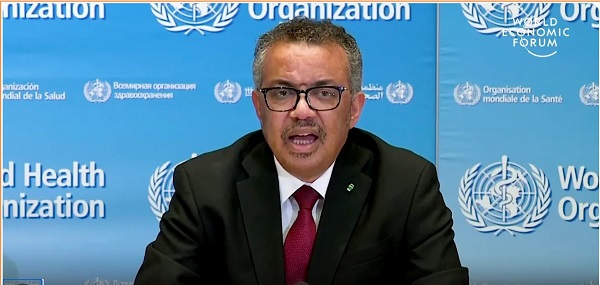Great Reset
Middle school girls who refused to compete against male banned from next track meet

From LifeSiteNews
Four of the five girls filed a lawsuit against the Harrison County Board of Education protesting the ban while Attorney General Patrick Morrisey said, ‘I will do everything in my power to defend these brave young girls. ‘This is just wrong.’
Five West Virginia female middle school athletes who refused to throw the shot put against a boy after a circuit court exempted him from a state law that prevents males from competing on female sports’ teams have been banned from participating in their next competition.
On April 18, the five girls attended the 2024 Harrison County Middle School Championships track and field meet where they were scheduled to compete in shot put.
The five students stepped out of the shot-put circle without throwing, forfeiting in protest of the participation of an eighth-grade male student presenting himself as a girl during the competition.
After four of the five girls filed a lawsuit against the Harrison County Board of Education protesting the ban, West Virginia Attorney General Patrick Morrisey stepped in and wrote an amicus brief on their behalf.
“I will do everything in my power to defend these brave young girls,” Morrisey wrote Monday on X. “This is just wrong. We must stand for what’s right and oppose these radical trans policies.”
“The only thing this decision does is teach these children to keep their mouths shut and not disagree with what they saw as unfairness,” said Morrisey, according to a statement from his office. “That is outrageous and it tramples these students’ rights to freedom of speech and expression.”
“Their actions at the earlier track meet were not disruptive or aggrandizing. They were the quiet demonstration of the student-athletes’ evident unhappiness with the competitive consequences of a federal appellate court’s decision,” said Morrisey, a Republican candidate for governor.
“Rather than being punished for their conduct or being sidelined in an effort to score points, all should commend these young athletes for putting their personal performances aside to demonstrate their discontent with an unjust result that affects them personally and within that event,” he said.
Other conservatives took to X to express support for the banned girls.
“How many young girls are losing opportunities because cowardly liberal and RINO politicians are caving to mental illness?” the Travis Media Group asked.
JUST IN: The 5 girls from Lincoln Middle School in West Virginia who protested a trans student participating in shot put by refusing to participate, have been banned from school sports.
Harrison County Board of Education made the decision, and now they’re being sued by the… pic.twitter.com/t6dannzqhg
— 🇺🇸Travis Media Group🇺🇸 (@TM1Politics) April 30, 2024
“Girls banned from girls’ sports instead of a male being banned from girls’ sports,” wrote Greg Scott, vice president of policy for the Center for Arizona Policy’s, noting, “and this isn’t California or New York. This is Wild and Abominable West Virginia.”
Girls banned from girls' sports instead of a male being banned from girls' sports.
And this isn't California or New York.
This is Wild and Abominable West Virginia. https://t.co/oTB0xwovh7
— Greg Scott (@GScottSays) April 30, 2024
“You can’t participate in this meet until you admit girls don’t exist,” said the Redheaded Libertarian, “unless you want abortions, because it’s your rights as girls.”
NEW: Five middle schoolers who refused to compete against a biological male in the shot put have been banned from future competitions.
Where are all the outraged feminists?
West Virginia Attorney General Patrick Morrisey is now filing a lawsuit against the Harrison County… pic.twitter.com/CntWcdJMJf
— Collin Rugg (@CollinRugg) April 30, 2024
Dr. Robert Malone
WHO and G20 Exaggerate the Risk and Economic Impact of Outbreaks

From Malone News
Poor quality modeling is being used by WHO and a G20 panel to project our risk of infectious disease pandemics and the financial requirements to address them.
Previously considered a once in a century event, major pandemics are now predicted to occur every 20 to 40 years.
Global authorities view this as an existential threat, and have called for a coordinated international response led by the World Health Organization or the WHO…but not everyone agrees with this perspective.
Researchers from the University of Leeds, including policy experts, Professor Garrett Brown and Dr David Bell, are challenging the assumptions behind these dire warnings. They question whether the massive resources being allocated to pandemic preparedness are truly supported by the evidence.
One of their critiques centers on a chart frequently cited by the WHO, which appears to show a dramatic increase in the outbreaks over the past two decades. Brown and Bell say the chart omits crucial historical context and misrepresents today’s health threats.
Long-standing diseases like yellow fever, influenza, cholera, and the plague have been steadily brought under control, and outbreaks of diseases like monkey pox or natural coronaviruses have likely remained consistent over time, but what has changed, they say, is our improved diagnostic technology enabling us to distinguish diseases more readily than ever before.
Essentially, as surveillance increases, so does the likelihood of finding diseases that may have existed but previously went unnoticed.
In reality, mortality from infectious diseases has been declining for decades, thanks to advances in hygiene, nutrition, medical treatments and reduced poverty, even with COVID 2020, to 2021, mortality remained below 2010 levels.
The WHO has identified nine priority diseases for research and development, yet five of these diseases have never caused more than 1000 recorded deaths in history, aside from COVID 19, whose origins remain a topic of debate, the rest of the diseases are largely confined to specific regions, primarily in parts of Africa.
On the list the WHO also includes a hypothetical outbreak that they call disease X – it’s a placeholder for an unknown outbreak that could emerge in the future.
And while it’s intended to promote vigilance, its severity is entirely speculative and can encourage modelers to use catastrophic scenarios to estimate future risk, causing governments to make fear-based policy decisions based on little evidence.
Brown and Bell are concerned that so much focus on speculative pandemic preparedness is diverting critical resources away from urgent health issues such as tuberculosis and malaria.
Tuberculosis alone kills 1.3 million people annually, while malaria accounts for over 600,000 deaths, mostly among children.
Although testing and treatment for these diseases is relatively inexpensive, their funding could be at risk as more resources are directed towards hypothetical future threats in 2022 a high level, independent panel was convened by the G20 to review our risk of pandemics and the financial requirements to address it.
But again, the two main pieces of evidence the panel relied on to draw its conclusions grossly exaggerated the actual risk of a pandemic.
The first report provided by the G20 panel analysed the major outbreaks of the past two decades, and it was poorly referenced, excluding Covid-19 and the 2009 swine flu, which caused fewer deaths than seasonal flu, the total number of deaths from these events over the last 20 years was under 26,000 a relatively insignificant figure in the context of global disease burdens.
The second report was from Metabiota, a former private. US based corporation, the two graphs provided appear to show an exponential increase in recorded outbreaks. Yet the researchers point out that this trend aligns with the development of modern diagnostic technologies, which naturally increase the detection of previously unnoticed diseases, indeed, the absence of recorded disease outbreaks in the 60s coincides with a lack of technology and communication systems needed to document them.
Metabiota report also included data from an article published in the British Medical Journal in 2023 it shows the rise in mortality outbreaks over the last decade is almost entirely due to Ebola outbreaks – and when these Ebola deaths are excluded from Metabiota data – the mortality trend over the last two decades shows a clear decline – a finding that contradicts the narrative of increasing pandemic risk, the financial demands of the pandemic agenda are another concern.
The G20 panel relied on a report released by the World Bank and the WHO in 2022, which sought $31.1 billion in funding, and an additional World Bank report, using poorly supportive data, sought another 10 to 11 billion annually.
On top this report referenced a 2020 study by Maryanne, which also claimed to show an increase in the frequency of disease outbreaks, but closer inspection reveals the opposite, a sharp decline in disease outbreaks between 2010 and 2020 – and like the Metabiota report – this World Bank report overlooks the fact that the development of new diagnostic tests could account for any observed increase In disease outbreaks since 1960.
Finally, the WHO report exaggerates the economic impact of outbreaks by including extraordinary costs of actions, such as stimulus packages, while downplaying the costs of endemic diseases used for comparison.
This creates a false impression that these relatively low fatality outbreaks were costlier than other diseases, and that such costs could be fully avoided while preparing for pandemics is undoubtedly important.
Brown and Bell argue that the narrative of escalating pandemic threats is misleading. They suggest that the risk from naturally occurring disease outbreaks may actually be decreasing with the rise in detected outbreaks, primarily a result of better diagnostic tools.
Researchers warn that essential global priorities such as cancer, tuberculosis, malaria and nutrition support could be neglected. For example, funding for nutrition development dropped 10% in 2020 and has yet to return to pre pandemic levels.
If resources continue to be diverted towards speculative future scenarios, proven efforts to combat the world’s deadliest diseases may be overshadowed and ultimately cause more harm than good.
Business
Publicity Kills DEI: A Free Speech Solution to Woke Companies

For years, major corporations bragged about their wonderful Diversity, Equity, and Inclusion (DEI) programs. They’re good for business and morally correct, they said. So why are they now cutting those programs?
Robby Starbuck says these programs once got a lot of buy-in, because people wanted to be nice! But DEI came to mean much more than just being nice.
Starbuck says what it looked like in practice was “crazy trainings” and “overtly racist hiring practices.” Now lots of people agree with him.
Companies actually take notice when Starbuck tells his many followers about their DEI programs. Often the programs get dropped.
That’s the power of free speech.
After 40+ years of reporting, I now understand the importance of limited government and personal freedom.
——————————————
Libertarian journalist John Stossel created Stossel TV to explain liberty and free markets to young people.
Prior to Stossel TV he hosted a show on Fox Business and co-anchored ABC’s primetime newsmagazine show, 20/20. Stossel’s economic programs have been adapted into teaching kits by a non-profit organization, “Stossel in the Classroom.” High school teachers in American public schools now use the videos to help educate their students on economics and economic freedom. They are seen by more than 12 million students every year.
Stossel has received 19 Emmy Awards and has been honored five times for excellence in consumer reporting by the National Press Club. Other honors include the George Polk Award for Outstanding Local Reporting and the George Foster Peabody Award.
_ _ _ _ _ _ _ _
To get our new weekly video from Stossel TV, sign up here: https://www.johnstossel.com/#subscribe
_ _ _ _ _ _ _ _
-

 2025 Federal Election1 day ago
2025 Federal Election1 day agoPoilievre refuses to bash Trump via trick question, says it’s possible to work with him and be ‘firm’
-

 2025 Federal Election2 days ago
2025 Federal Election2 days agoPoilievre to let working seniors keep more of their money
-

 2025 Federal Election2 days ago
2025 Federal Election2 days agoVoters should remember Canada has other problems beyond Trump’s tariffs
-

 Community2 days ago
Community2 days agoSupport local healthcare while winning amazing prizes!
-

 COVID-191 day ago
COVID-191 day ago17-year-old died after taking COVID shot, but Ontario judge denies his family’s liability claim
-

 Daily Caller2 days ago
Daily Caller2 days agoCover up of a Department of Energy Study Might Be The Biggest Stain On Biden Admin’s Legacy
-

 International2 days ago
International2 days agoVice President Vance, Second Lady to visit Greenland on Friday
-

 Business1 day ago
Business1 day agoWhile “Team Canada” attacks Trump for election points, Premier Danielle Smith advocates for future trade relations




